How to Pop Your Ears When Flying

From making sure you pack everything you need to getting through security, traveling is one of the most anxiety-inducing experiences we regularly endure—and that’s before you get on the plane. Once you’re there, however, there are any number of potential stressors, including the sudden realization that your ears are clogged. Pressure buildup in the ear can leave you feeling uncomfortable and in pain for the entire flight. That’s why it’s so important to know how to deal with a clogged ear in a safe and painless way. Read on to find out more about this frustrating condition, and how to pop your ears when flying.
RELATED: 10 Sleeping Tips for a Long-Haul Flight.
Why Do My Ears Feel Clogged on Planes?
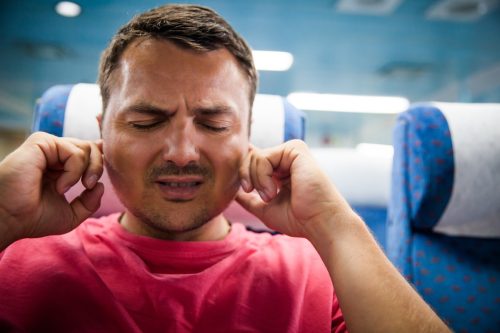
Most travelers agree that “one of the worst feelings when flying is dealing with those stubborn, clogged ears,” says Fiona Spinks, travel expert and solo adventurer.
“You know the drill: takeoff and landing, and suddenly you feel like your ears are stuffed with cotton,” she says. “It’s super annoying.”
This condition is often known as “airplane ear.” But in clinical terms, it may be referred to as ear barotrauma, barotitis media, or aerotitis media, according to the Mayo Clinic.
You can experience airplane ear in one or both ears. Common symptoms of this condition include moderate discomfort or pain in your ear, feelings of fullness or stuffiness in your ear, and muffled hearing or slight to moderate hearing loss.
RELATED: How to Get Water Out of Your Ear, According to Doctors.
Why Do Clogged Ears Happen?
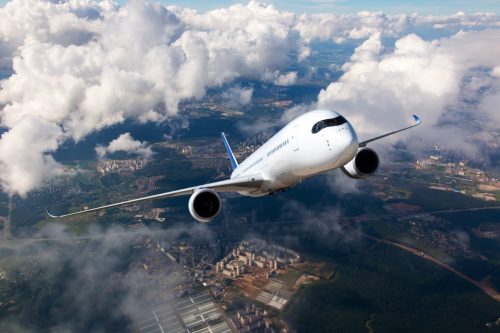
Travelers are most likely to experience airplane ear during takeoff and landing, according to Soma Mandal, MD, a board-certified internist working with Summit Health in New Providence, New Jersey.
“This occurs due to changes in air pressure,” she explains. “The middle ear is connected to the back of your throat by the Eustachian tube, which helps equalize pressure between the middle ear and the external environment. During rapid altitude changes, such as those experienced in an airplane, the pressure differences can cause the Eustachian tube to become temporarily obstructed, leading to that clogged sensation.”
As Mandal elaborates, the Eustachian tube isn’t always able to open quickly enough to equalize air pressure when pressure changes rapidly, like it does during the ascent and descent of a flight.
“This results in a pressure imbalance, causing the eardrum to bulge inward or outward, which can lead to discomfort, a feeling of fullness, and diminished hearing,” she says.
Your risk of experiencing painful airplane ear may be even higher if you’re sick or dehydrated, orthopedic surgery specialist Sam Hilton, DO, cautions.
“Staying hydrated is important, as dry air in the cabin can lead to dehydration, which might exacerbate ear discomfort,” he advises. “If you have a cold, sinus infection, or allergies, manage these conditions with appropriate medications before flying, as they can worsen Eustachian tube blockage.”
How to Pop Your Ears Without It Hurting
You don’t have to sit around in pain waiting for airplane ear to go away. Experts say there are several different tricks that may help relieve ear pressure while you’re still on your flight. Here are five methods you can use to pop your ears without it hurting.
RELATED: What Really Happens If You Clean Your Ears With Cotton Swabs, According to Doctors.
1. Make yourself yawn.
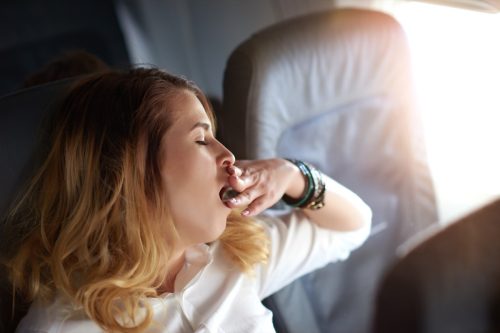
Yawning or fake yawning is one of the most painless ways to pop your ears naturally. That’s because “opening your mouth wide stretches muscles that can help open Eustachian tubes,” according to commercial pilot Justin Crabbe.
“This allows for gentle pressure equalization, and it avoids forceful methods that might cause pain,” he explains.
2. Use the Valsalva maneuver.
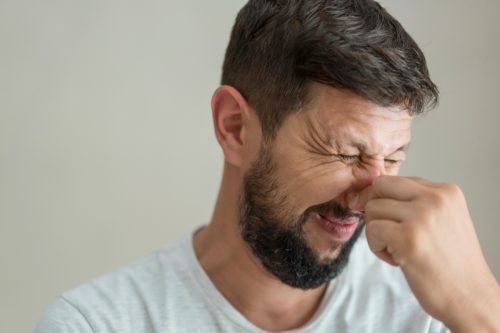
You’ve probably used the Valsalva maneuver in the past, even if you don’t know it by name. This is where you “close your mouth, pinch your nostrils shut, and gently blow as if you are trying to blow your nose,” according to Hilton.
“This increases pressure in the throat, which can help open the Eustachian tubes,” he notes.
But in order to make sure this painlessly pops your ears, Hilton warns travelers to avoid blowing too hard, which can damage your eardrums.
3. Or try the Toynbee maneuver.

The Toynbee maneuver is another method people might not know by name despite relying on it to pop their ears. Like the Valsalva maneuver, you need to pinch your nostrils shut for this trick. But instead of blowing outward, the Toynbee maneuver requires you to swallow inward while your nose is closed.
“This technique combines the movements of swallowing and pressure equalization, which can help open the Eustachian tubes and relieve the clogged sensation,” Hilton explains.
To help with this method, travel expert and content creator Dana Yao suggests taking a sip of water, as this can make swallowing easier for you.
4. Chew some gum.
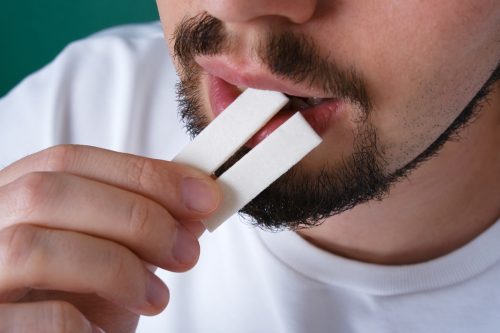
You might want to take a pack of gum with you on your next flight. Chewing gum is the top method Jerry Friedman, DDS, oral surgeon at North Jersey Oral and Maxillofacial Surgery, recommends to pop your ears while flying.
“When the plane is taking off, stick in a piece of gum and chew all throughout the ascent,” he suggests. “That alone is often enough to help your ears pop and adjust to the changing altitude.”
As Spinks explains, chewing gum can relieve ear pressure by getting your jaw moving.
“Plus, the act of chewing might also make you yawn, giving you double the chances to pop those ears,” she points out. “It’s a two-for-one deal!”
5. Use earplugs that are designed for flying.
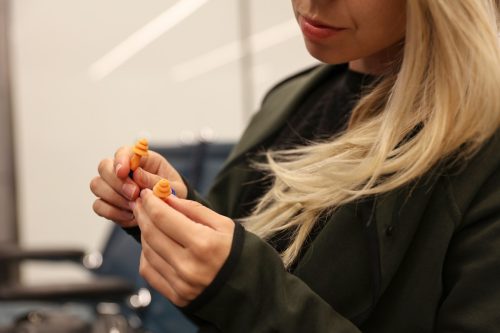
Bringing special earplugs on your next flight can make a big difference. According to Mandal, earplugs that are designed for flying (like EarPlanes) can help your ears pop without hurting, as they regulate pressure changes more gradually.
“These earplugs contain a small filter that slows the rate of pressure change, making it easier for your ears to adjust,” she says.
To best utilize these earplugs, Yao recommends that you “insert them before takeoff and remove them once the plane has reached cruising altitude, then reinsert them before descent.”
RELATED: 12 Long-Haul Flight Hacks You Need to Know, According to Travel Pros.
What Should I Do When My Ears Won’t Pop?
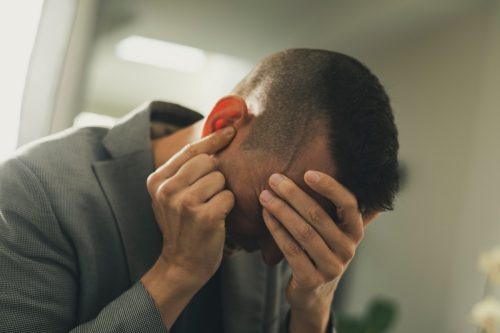
If you’ve tried all these methods and your ears still won’t pop, the first thing you should do is stay calm, Yao advises.
“Just continue swallowing, yawning, or chewing gum,” she suggests. “Sometimes, it takes a bit of time for the pressure to equalize.”
You should also “drink plenty of fluids to keep your mucous membranes moist,” Mandal recommends.
And avoid caffeine and alcohol, as “they can make the problem worse,” Crabbe adds.
Finally, don’t be afraid to consider turning to medication if you have trouble popping your ears.
“Over-the-counter nasal decongestants or oral decongestants can help reduce swelling in the nasal passages and Eustachian tubes,” Mandal notes. “I usually recommend taking an over-the-counter decongestant about 30 minutes before a flight.”
When Should I See a Doctor About Clogged Ears?
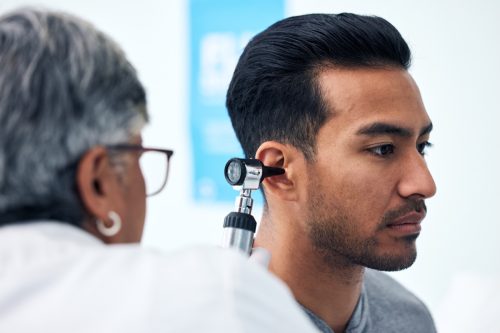
If your ears still feel clogged or painful more than a few days after your flight, Mandal recommends consulting an otolaryngologist or your primary care physician. You should also see a doctor immediately if you experience any of the following symptoms after a flight: ear discharge, severe ear pain, dizziness, or hearing loss.
“These could be signs of an ear infection, significant Eustachian tube dysfunction, or other underlying issues that require medical attention,” warns board-certified neurologist Rizwan Bashir, MD.
If your ears frequently get clogged during flights or you experience severe clogging, Rob Burley, travel tour operator expert and the founder of GP Traveller, recommends seeing an ear, nose, and throat (ENT) specialist.
“They can provide you with personalized advice and potential treatment options,” he notes.
Wrapping Up
That’s it for our guide on how to how to pop your ears when flying so you can make sure you’re comfortable whenever you travel. But be sure to check back with us soon for more content that can help you be better prepared for all your future flights.
- Source: Mayo Clinic: Airplane Ear